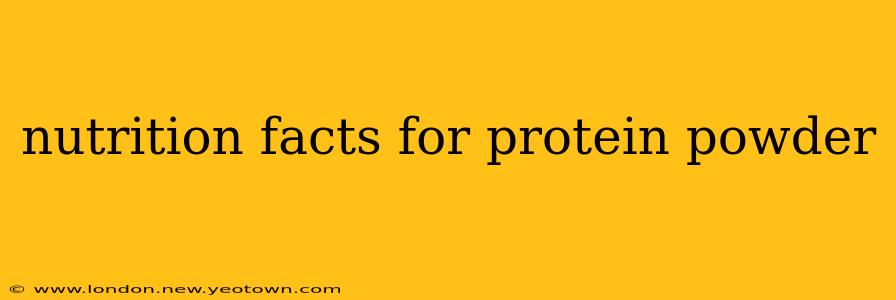Choosing the right protein powder can feel like navigating a nutritional minefield. With so many brands and formulas on the market, understanding the nutrition facts label is crucial. This isn't just about the grams of protein; it's about understanding the complete nutritional picture to make an informed choice that aligns with your health goals.
Imagine this: You're standing in the supplement aisle, overwhelmed by the colorful tubs and bold claims. You reach for a scoop, ready to fuel your workouts, but then…the nutrition label. Rows of numbers and percentages stare back, leaving you feeling more confused than ever. Let's change that. This guide will break down the key components of a protein powder nutrition label, empowering you to make smarter choices.
What are the key things to look for on a protein powder label?
This is the core question many people have. Let's dive into the essential components:
Protein Content (per serving): This is the most obvious, but not the only, thing to check. Look for the grams of protein per serving. The amount will vary depending on the type of protein powder (whey, casein, soy, etc.). Consider your daily protein needs based on your activity level and goals. Remember that the type of protein also impacts digestion and absorption rates.
Calories (per serving): Protein powder contributes to your daily calorie intake. Consider how this aligns with your overall dietary goals. Higher-calorie options might be suitable for those aiming to gain weight, while lower-calorie choices might be better for weight management.
Carbohydrates (per serving): This section details the total carbohydrates, including sugars and fiber. Some protein powders are low-carb, while others contain added sugars or naturally occurring carbohydrates. Pay attention to the source and amount of carbs – high added sugar contents should be avoided.
Fat (per serving): Protein powders typically contain a small amount of fat. The type of fat matters; look for healthy fats like unsaturated fats and avoid those with excessive saturated or trans fats.
Added Sugars (per serving): Many protein powders contain added sugars to enhance taste. However, excessive added sugar can negatively impact your health. Opt for protein powders with minimal or no added sugars.
What are the different types of protein powder and how do their nutrition facts compare?
Different protein sources boast unique nutritional profiles:
- Whey Protein: Generally high in protein and relatively low in carbohydrates and fat. It's a fast-digesting protein, making it popular among athletes.
- Casein Protein: Slower-digesting than whey, it provides a sustained release of amino acids. It often has slightly more carbohydrates and fat than whey.
- Soy Protein: A plant-based option, typically lower in fat than whey but can contain higher amounts of carbohydrates.
- Pea Protein: Another plant-based choice, generally lower in carbohydrates and fat than soy, and often hypoallergenic.
How much protein powder should I consume daily?
The ideal daily protein intake depends on several factors, including your age, activity level, goals (weight loss, muscle gain, maintenance), and overall health. Consulting a healthcare professional or registered dietitian is recommended to determine the appropriate amount for you. General guidelines suggest consuming 0.8 grams of protein per kilogram of body weight for sedentary individuals. This can increase significantly for athletes and those actively building muscle.
Are there any potential side effects of consuming protein powder?
While generally safe, excessive protein powder consumption may lead to digestive issues like bloating, gas, or constipation. It can also strain the kidneys, particularly for individuals with pre-existing kidney conditions. Moderation is key, and staying hydrated is crucial when incorporating protein powder into your diet.
What are the best protein powders for weight loss?
There’s no single “best” protein powder for weight loss. Success depends on a balanced diet and exercise. However, low-calorie, low-carbohydrate, and low-sugar options can aid in weight management. Choose wisely, consulting your doctor or a nutritionist to find the best fit for your needs.
By carefully reviewing the nutrition facts label and understanding the different types of protein powders available, you can make informed choices to support your health and fitness goals. Remember to choose wisely, and consult with healthcare professionals if you have any questions or concerns.

